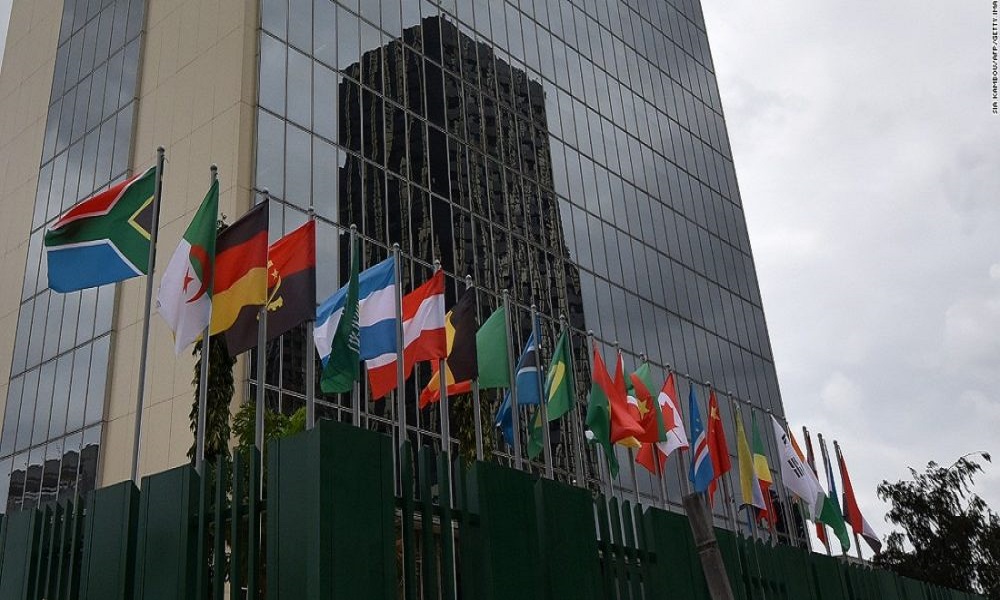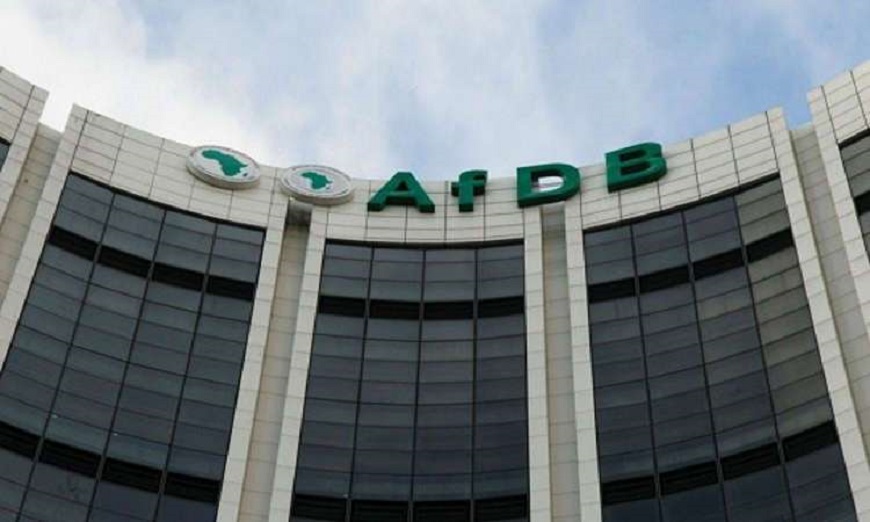Economy
S&P Affirms AfDB’s ‘AAA/A-1+’ Ratings; Outlook Stable

By Modupe Gbadeyanka
Global rating agency, Standard and Poors has affirmed its AfDB’s ‘AAA/A-1+’ Ratings with Outlook Stable. This is similar to Fitch’s recent affirmation of the Bank’s Triple ‘A’ rating with Stable Outlook as well.
In the statement, S&P summarised its ratings released on July 31, 2017 said it expects the African Development Bank (AfDB) will further increase its lending over the next two years, while maintaining its current stand-alone credit quality, with a very strong business profile and very strong financial profile.
“In addition, we incorporate into our ratings on AfDB potential extraordinary shareholder support, owing to callable capital from ‘AAA’ rated sovereigns.
“The outlook remains stable, reflecting our expectation that, over the next two years, the Bank will continue fulfilling its development mandate, benefiting from preferred creditor treatment, and that the amount and willingness of extraordinary shareholder support to the Bank will remain unchanged,” the rating agency said.
“The ratings on AfDB reflect our assessment of the bank’s business profile as very strong and its financial profile as very strong.
“Our assessment of its stand-alone credit profile (SACP) remains at ‘aa+’. We incorporate a one-notch uplift for extraordinary shareholder support from AfDB’s SACP, leading to our ‘AAA’ long-term rating on the bank,” the S&P report added.
The AfDB Group includes soft-loan windows – the African Development Fund (ADF), and the Nigeria Trust Fund (NTF). The Bank’s membership includes 54 African countries and 26 non-regional countries. AfDB lends predominantly to sovereigns, comprising about 76% of total credit exposures, while private-sector lending represents 21% of total credit exposures as of December 31, 2016.
“Our assessment of AfDB’s very strong business profile is based on our view of the bank’s role, public policy mandate, membership support, expectation for preferred creditor treatment (PCT), and governance. Most of the Bank’s sovereign lending has been concentrated in more economically developed regional members with strong creditworthiness. In 2014, the bank revised its credit policy to increase the number of member countries eligible to borrow, namely to include those member countries that while still economically developing, show improved creditworthiness.”
S&P reiterated the Bank’s history of fulfilling its mandate by providing financing, particularly for infrastructure development, through economic cycles.
It notes that the robust demand for its lending – which led to a nearly 30% increase in its loan portfolio during the 2009 global financial crisis – has reinforced its role.
AfDB currently uses the ADF and the NTF windows to provide assistance to member countries whose governments are currently not eligible to borrow from the Bank.
Among African governments, 17 are eligible to borrow only from AfDB, while 34 members may borrow only from the ADF and the NTF, and three countries are eligible to borrow under all three windows.
“We believe that expanding the number of eligible borrowing sovereigns in 2014 reinforces the Bank’s public policy role and mandate on the continent, although we expect only a gradual build-up of investments in these new eligible countries,” S&P said.
At the end of 2016, the Bank’s outstanding exposures increased significantly by 22.5% totaling UA (official reporting currency of the AfDB) 32.7 billion (US$43.9 billion), largely led by a 27% increase in sovereign exposure.
The report underscores AfDB’s views of private-sector financing as a key contributor to economic growth and development in regional member countries and is actively increasing its private sector, non-concessional, non-sovereign guaranteed exposure. AfDB aims to direct 40% of its total approvals to this asset class over the medium term. We consider that this strategy could weigh on the Bank’s business profile, if it implies the Bank is unable to fulfill its development mandate or maintain its financial performance targets, namely strong capital adequacy and asset quality, as a result of this growth. If we were to assess an increasing share of private-sector lending as less essential to the Bank’s public policy mandate than its traditional exposures, we could change our view of the Bank’s role, and our assessment of AfDB’s business profile could weaken. Rising exposure to the private sector could also worsen our risk-adjusted capital (RAC) ratio for AfDB and ultimately its financial profile, as private-sector lending would be ineligible for PCT.
“The Bank’s business profile incorporates our expectation that it will continue to receive PCT on its public sector exposure, an internationally recognized practice of excluding multilateral lending institutions (MLIs) from restructuring or rescheduling of sovereign debt. In our view, AfDB’s track record of PCT is weaker than that of other ‘AAA’ MLI peers. The Bank has experienced both arrears and defaults by public- and private-sector borrowers, respectively. Zimbabwe, Sudan, and Somalia are in arrears on their sovereign-guaranteed loans, reflecting large legacy outstanding balances. We understand that Zimbabwe is also working with the World Bank and other multilateral development banks on a plan to clear these arrears,” it read.
The report noted that the AfDB is in the process of further strengthening aspects of its governance and risk management in light of its weaker track record in managing asset quality, particularly for its non-sovereign guaranteed portfolio. “This is a priority for the Bank’s President, Akinwumi Adesina, of Nigeria, who assumed office on Sept. 1, 2015.” The agency says is expects the level of non-performing loans will rise, owing to the difficult operating environment facing its commodity dependent borrowing members and the increasing share of the non-sovereign loans. “This highlights the importance for prudently approving new loans and carefully monitoring the composition and credit quality of the overall portfolio. We could change our view on the bank’s business or financial profile if the controls and/or financial performance of the non-sovereign exposures do not meet our expectations.
“AfDB’s very strong financial profile reflects its capital adequacy and its funding and liquidity. S&P Global Ratings’ primary metric to assess capital adequacy, the RAC ratio, was 20.9% before adjustments specific to MLIs as of year-end 2016,” the statement added.
It noted, however, that after taking into account S&P Global Ratings’ MLI-specific adjustments, the RAC ratio was 21.3%. For AfDB, the predominant adjustment is a concentration penalization for sovereign exposures, which our expectation for continuing PCT somewhat offsets. The decline in the RAC ratio to 21.3% in 2016 from 24.4% in 2015 incorporates the significant increase in the bank’s total exposure by 22.5% to UA32.7 billion in 2016, from UA26.7 billion in 2015. It also reflects relatively rapid loan growth to the broader list of potentially less-creditworthy African countries following the amendment to the bank’s credit policy in 2014.
The agency further notes that asset quality is a rating weakness for AfDB relative to similarly rated MLIs, reflecting its focus on private- and public-sector borrowing in geographic areas that carry intrinsically higher operating and credit risks. NPLs in the private sector portfolio deteriorated in 2016 to a reported 7.6% of total private sector loans, up from 6.2% one year earlier. However, we note that NPLs for AfDB’s total loan book, including both private and public sector loans, stood at a moderate ratio of 1.9% of total portfolio.
It says given currently low commodity prices and weak global growth, we believe private sector asset quality will continue to weaken further in 2017. We consider AfDB’s loan loss reserve coverage to be modest, at 55% of impaired balances on Dec. 31, 2016, up from 49% one year earlier, with the prospect for increased provisioning in 2017. While its average coverage is low for a financial institution operating in Africa, the bank benefits from our expectation of PCT.
Noting that AfDB’s funding profile remains very diverse in terms of investor base, currency, and maturity, it avers that global benchmark bonds would remain the primary source of funding, with alternative sources from domestic markets, green bonds, Uridashi bonds, private placements, and loans. It further notes that the bank has a positive funding gap up to the two-year static gap. Thus, its positive funding ratio indicates that AfDB is structurally able to cover its scheduled debt repayments without recourse to new issuance for up to two years. However, this does not take into account new disbursements which have led to a marginal negative funding gap emerging over the five-year tenor.
“In our opinion, AfDB’s management of liquidity is sound, aided by the high level of liquid assets the Bank holds on its balance sheet,” the report said, noting that the Bank maintains a strong liquid asset cushion, accounting for 40.2% of adjusted total assets, 57.9% of gross debt, as of Dec. 31, 2016. Liquid assets it said, comprise high quality bonds, largely in the ‘AAA’ (45%) and ‘AA’ (38%) rating range, cash, and a small portfolio of asset backed securities. S&P liquidity ratios for AfDB indicate that the Bank would be able to fulfil its mandate for at least one year, even under extremely stressed market conditions, without access to the capital markets. It furthers estimates that that the Bank would not need to reduce the scheduled disbursements of its loan commitments, even if half of the total commitments were to be drawn in one year. “On this measure, we estimate year-end 2016 liquidity ratios were 1.9x at the one-year horizon without any loan disbursements and 1.2x with half-scheduled loan disbursements,” the report concluded.
Economy
NASD Exchange Rises 1.22% on Sustained Bargain-Hunting

By Adedapo Adesanya
Strong appetite for unlisted stocks further raised the NASD Over-the-Counter (OTC) Securities Exchange by 1.22 per cent on Friday, February 27.
Data revealed that the NASD Unlisted Security Index (NSI) was up by 49.41 points to 4,083.87 points from 4,034.46 points, and lifted the market capitalisation by N19.56 billion to N2.433 trillion from N2.413 trillion.
The volume of securities bought and sold by investors increased by 243.0 per cent to 4.5 million units from 1.3 million units, and the number of deals grew by 15.8 per cent to 44 deals from 38 deals, while the value of securities went down by 19.7 per cent to N82.5 million from N102.8 million.
Central Securities Clearing System (CSCS) Plc ended the session as the most active stock by value on a year-to-date basis with 35.0 million units valued at N2.1 billion, followed by Okitipupa Plc with 6.3 million units worth N1.1 billion, and Geo-Fluids Plc with 122.8 million units transacted for N480.4 million.
Resourcery Plc ended the day as the most traded stock by volume on a year-to-date basis with 1.05 billion units sold for N408.7 million, followed by Geo-Fluids Plc with 122.8 million units valued at N480.4 million, and CSCS Plc with 35.0 million units traded for N2.1 billion.
There were six price gainers yesterday led by FrieslandCampina Wamco Nigeria Plc, which added N9.02 to close at N111.46 per unui compared with the previous day’s N102.44 per unit, Nipco Plc appreciated by N6.00 to N284.00 per share from N278.00 per share, CSCS Plc recouped N1.87 to sell at N70.12 per unit versus Thursday’s value of N68.25 per unit, Geo-Fluids Plc improved by 17 Kobo to close at N3.18 per share versus N3.01 per share, Industrial and General Insurance (IGI) Plc advanced by 5 Kobo to sell at N50 Kobo per unit versus the preceding day’s 45 Kobo per unit, and Acorn Petroleum Plc chalked up 2 Kobo to settle at N1.34 per share, in contrast to the previous day’s N1.32 per share.
Economy
FX Liquidity Crunch Sinks Naira to N1,363/$1 at NAFEX, N1,370/$1 at Black Market

By Adedapo Adesanya
The Naira performed poorly against the United States Dollar in the different segments of the foreign exchange (FX) market on February 27, closing the week without a gain.
In the black market, the domestic currency weakened against the Dollar yesterday by N5 to close at N1,370/$1 compared with Thursday’s closing price of N1,365/$1, and at the GT Bank forex desk, it lost N2 to sell N1,369/$1 versus the N1,367/$1 it was sold a day earlier.
Yesterday, the Nigerian Naira lost N3.75 or 0.26 per cent against the greenback at the Nigerian Autonomous Foreign Exchange Market (NAFEX) to trade at N1,363.39/$1 compared with the previous day’s N1,359.82/$1.
Also, the Naira depreciated against the Euro at the official market during the session by N2.33 to quote at N1,609.22/€1 versus N1,606.89/€1, and appreciated against the Pound Sterling by N6.74 to settle at N1,836.49/£1 compared with the preceding session’s N1,843.23/£1.
The Naira’s latest depreciation occurred as FX demand continued to outpace available supply, intensifying pressure in the market.
In response to the negative momentum, the Central Bank of Nigeria (CBN) intervened by selling Dollars to banks and other authorised dealers in an effort to stabilise the local currency. The move came barely a week after the apex bank had purchased about $190 million from the foreign exchange market to temper the Naira’s rally.
Specifically, the CBN injected $200 million into the official market between Tuesday and Wednesday through an intervention call. However, the liquidity support proved insufficient to reverse the currency’s downward trend.
Meanwhile, the cryptocurrency market declined on Friday, with Solana (SOL) down by 10.4 per cent to $78.60, as Dogecoin (DOGE) decreased by 9.5 per cent to $0.0982.
Further, Cardano (ADA) slumped 8.9 per cent to $0.2647, Ethereum (ETH) slipped by 8.6 per cent to $1,859.10, Ripple (XRP) shrank by 8.2 per cent to $1.30, Litecoin (LTC) lost 1.4 per cent to close at $52.39, Bitcoin (BTC) slid 5.9 per cent to $63,686.39, and Binance Coin (BNB) went down by 4.9 per cent to $596.64, while the US Dollar Tether (USDT) and the US Dollar Coin (USDC) traded flat at $1.00 apiece.
Economy
Oil Prices Climb on Geopolitical Anxiety

By Adedapo Adesanya
Oil prices rose about 2 per cent on Friday, with traders bracing for supply disruptions as nuclear talks between the United States and Iran were without an agreement.
Brent crude futures settled at $72.48 a barrel after chalking up $1.73 or 2.45 per cent, while US West Texas Intermediate crude futures finished at $67.02 a barrel, up $1.81 or 2.78 per cent.
The two sides agreed to extend indirect negotiations into next week, but traders grew sceptical that an agreement between US President Donald Trump’s administration and Iran was possible.
The US and Iran held indirect talks in Geneva on Thursday after Mr Trump ordered a military buildup in the region.
Oil prices gained during the talks, on media reports indicating that discussions had stalled over U.S. insistence on zero enrichment of uranium by Iran. However, prices eased after the mediator from Oman said the two sides had made progress.
They plan to resume negotiations with technical-level discussions scheduled next week in Vienna, Omani Foreign Minister Sayyid Badr Albusaidi said on X.
Market analysts noted that geopolitical risk premiums of $8 to $10 a barrel have been built into oil prices on fears that a conflict will disrupt Middle East supply through the Strait of Hormuz, where about 20 per cent of global oil supply passes.
To cushion the impact from a possible strike, one of the world’s largest oil producers, the United Arab Emirates (UAE), is set to export more of its flagship Murban crude in April, while Saudi Arabia said it would also increase oil production.
Additionally, Saudi Arabia may raise its April crude price to Asia for the first time in five months due to higher demand from India to replace Russian supplies, potentially raising it by about $1 a barrel.
Meanwhile, the Organisation of the Petroleum Exporting Countries and its allies (OPEC+) is likely to consider raising oil output by 137,000 barrels per day for April at its March 1 meeting, after suspending production increases in the first quarter.
The resumption of output increases after a three-month pause would allow Saudi Arabia and the UAE to regain market share at a time when other OPEC+ members, such as Russia and Iran, contend with Western sanctions while Kazakhstan recovers from a series of oil production setbacks.
Eight OPEC+ producers – Saudi Arabia, Russia, the United Arab Emirates, Kazakhstan, Kuwait, Iraq, Algeria and Oman will meet at the meeting on Sunday.
-

 Feature/OPED6 years ago
Feature/OPED6 years agoDavos was Different this year
-
Travel/Tourism10 years ago
Lagos Seals Western Lodge Hotel In Ikorodu
-

 Showbiz3 years ago
Showbiz3 years agoEstranged Lover Releases Videos of Empress Njamah Bathing
-

 Banking8 years ago
Banking8 years agoSort Codes of GTBank Branches in Nigeria
-

 Economy3 years ago
Economy3 years agoSubsidy Removal: CNG at N130 Per Litre Cheaper Than Petrol—IPMAN
-

 Banking3 years ago
Banking3 years agoSort Codes of UBA Branches in Nigeria
-

 Banking3 years ago
Banking3 years agoFirst Bank Announces Planned Downtime
-

 Sports3 years ago
Sports3 years agoHighest Paid Nigerian Footballer – How Much Do Nigerian Footballers Earn




















